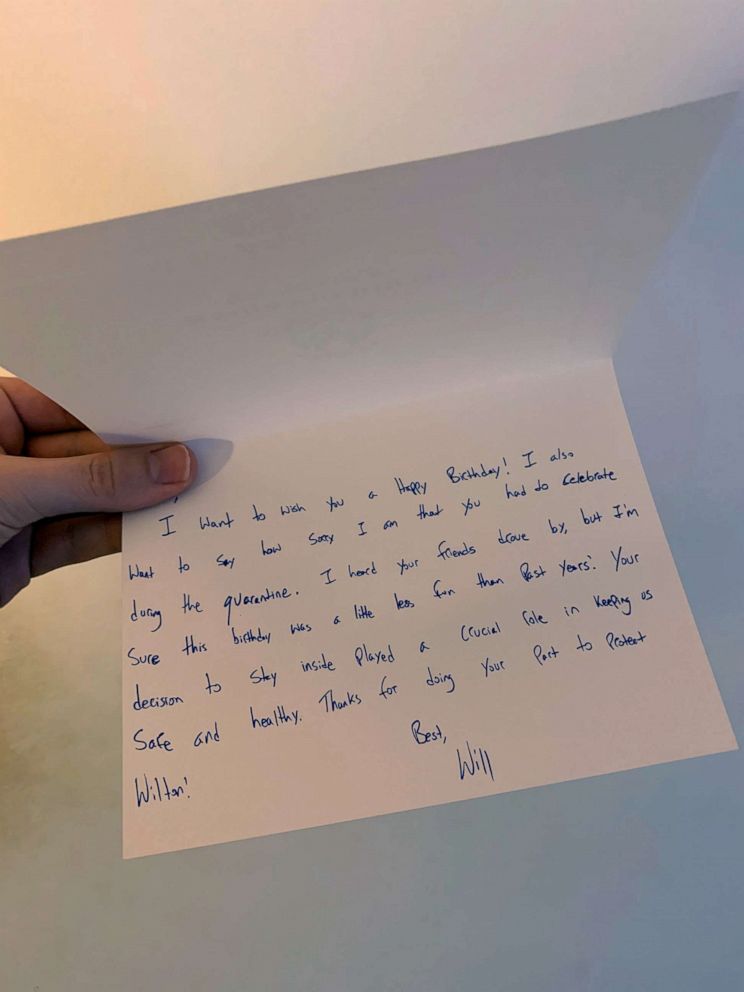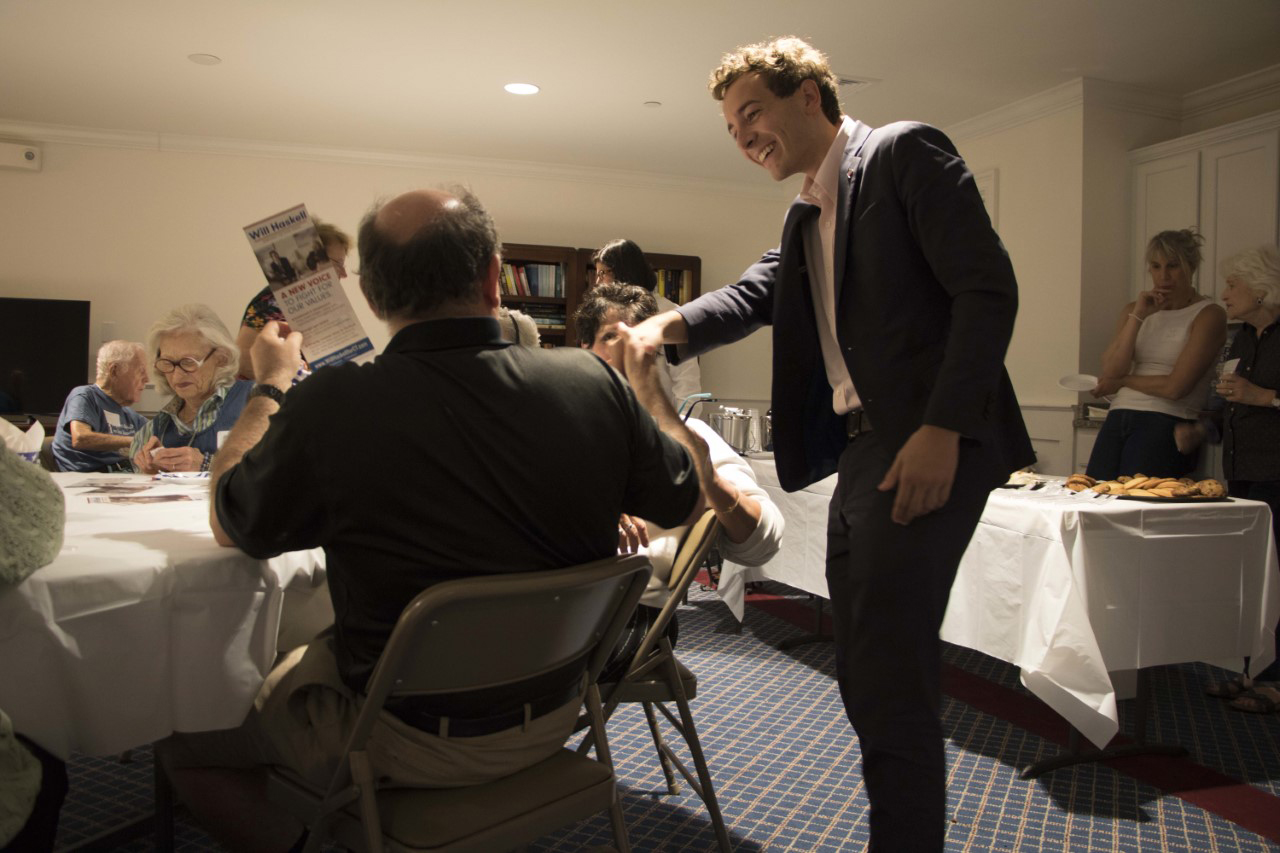A 23-year-old state senator aims to help flatten Connecticut's COVID-19 crisis curve
Coronavirus spread like wildfire after a March party in Westport.
Just over a year after taking office, 23-year-old State Sen. Will Haskell, D-Conn., is at the helm of a crisis that legislators many years his senior would be stumped by: seeking to flatten the curve at the epicenter of a coronavirus outbreak in his state.
Though the state barely had any cases six weeks ago, coronavirus spread like wildfire after a party at the beginning of March in Westport, Conn., a town of roughly 28,000 that lines the Long Island Sound.
Westport is also Haskell’s hometown, and one of the seven towns in Fairfield County that make up the district he represents — Connecticut’s 26th District. Haskell was elected in November of 2018, a few months after he graduated college.
On Friday, Fairfield County had 42% of the state’s known positive cases, a disproportionate number for an area that's just over 25% of the state’s population. 425 of the 1,036 deaths in the state have been in Fairfield County. From the beginning of the outbreak, it has been the state’s epicenter of the virus.
“People are turning to their government in a way that we really only read about in history books, in terms of the support and the help that they're looking for,” Haskell said, describing the number of calls and emails as both “astounding” and “always urgent.”
“I think as elected officials, the reason that this is such a challenging job right now is we've got to get them answers right away, you know, It's almost — 24 hours is almost too long for some people to wait for these pressing concerns,” Haskell said.
Senate Majority Leader Bob Duff, a Democrat who represents a neighboring district, was elected 18 years ago — just a few years after Haskell was born. Blizzards, Hurricane Sandy and the major power outages that ensued all “pale in comparison” to handling coronavirus, Duff said. Even with his decades of experience, “nothing has ever quite come to this.”
To that end, Duff noted that no one, regardless of their time spent in office, has the experience to deal with a pandemic like this.
“For a guy who's only been in office for one year, [Haskell] brings a high level of maturity and experience with him,” Duff said. “I have all confidence that he instinctively knows what to do. He's got a very good instinct.”
And given the outbreak in Haskell’s district, he’s had to rely largely on instinct. No other district in Connecticut was hit as hard and as early as the district he represents, which is located just an hour from New York City.
He’s heard from school teachers who are struggling with remote learning, people facing evictions and families who’ve seen two or three sources of income disappear.
One night, Haskell received a call from a nurse at a nearby hospital who needed to get her hands on more personal protective equipment. He’d taken down the request but then realized she also just wanted to talk. She’d accepted, with “absolute certainty,” Haskell said, that she would get coronavirus at some point.
“And that sort of opens your eyes to it,” Haskell said.
“The rest of us are hoping not to get it, she knows she’s going to get it. She walks into work every day expecting to get it. It’s crazy, it’s crazy.”
He’s also heard from his own family — including his father and step-mother, both of whom tested positive for coronavirus in late March.
“So it's — it has been incredibly stressful,” he said.

And while Haskell hasn’t been busier in his life, he's also staying inside and mostly wearing sweatpants -- an odd combination, he noted.
“You can miss a million things if you take a shower for too long,” Haskell said.
For now, his message for the rest of the state, and the country, is to be warned.
“Understand that Westport is a harbinger of what's coming — that this is a cautionary tale,” Haskell told ABC News in a phone interview from his couch.
Fairfield County, where Haskell’s district is, has some of the highest household incomes in the state. National data has shown that lower income communities are harder hit by the virus. His message is particularly important as the virus progresses to other counties, given the income disparities across Connecticut.
Asked what he would share with other local governments across the country that are quickly staring down the barrel of a public health crisis that most expected would hit major cities long before it hit suburban towns, Haskell said it’s too early to share success stories.
“I do think that this area was sort of a shot in the dark or a warning for the rest of Connecticut about what's to come,” Haskell said.
In one respect, Haskell is uniquely suited to have first taken on this crisis because, unlike many in the Connecticut legislature, he’s far from the high-risk demographic. At 23 years old, one of his main goals is to communicate with other young people who think the virus isn’t their problem.
“As a young person in politics and as the youngest member of the General Assembly, I feel a responsibility to really get the message out to young people on Instagram and on Twitter that this is not a snow day. This is not a vacation, this is not a reason to go outside and see your friends,” Haskell said.

It’s a message he’s repeated over and over, verbatim, in Facebook town halls and phone conference town halls, getting the message out to a handful of people at a time.
“Although we might not be vulnerable personally — although we might not be at risk of dying from COVID 19 — if you love your grandparents, you've got to stay inside,” Haskell said.
But in handling the crisis, which has magnified the importance of local governments around the country, Haskell has also made accessibility to all ages his main priority.
He gives his personal cell phone number out to everyone who asks — and offers it up constantly to those who don’t. Haskell holds Facebook town halls and goes live on Instagram, reserves hours for “ask me anything” sessions on Twitter and holds telephone town halls, which are usually dialed into by older residents who participate from landlines.
“I only rarely regret doing so, but I give out my cell phone number to anyone and everybody who asks,” Haskell said. “It means that, you know, my voicemail box is often full and it can be hard to get back to everybody, but usually I call everybody back over the course of a day, just to try to make sure that nobody feels overlooked by their elected officials.”
Connecticut Gov. Ned Lamont, who Haskell called a mentor, spoke of Haskell’s unusually personal approach in a statement to ABC News.
“Senator Haskell is an incredibly thoughtful, caring and active voice during this health crisis—most of which is unfolding in the part of our state he represents,” Lamont said in the statement. “During these times, it is essential that our leaders ensure the public is informed and Will does a great job using an array of social media to stay connected and engaged with his constituents.”
No more so has that mattered to constituents than during the coronavirus epidemic, as people search for answers about testing availability, symptoms and safety precautions — often getting confusing responses as research develops and resources remain in flux.
Connecticut, for example, has lagged behind other states in reported test results per capita, coming in 13th, according to data from the COVID Tracking Project. At times, testing was reserved only for the sickest patients for fear that responders doing the tests will use much-needed PPE, while other times testing has been ramped up again, Lamont has said during his daily press conferences.
Meanwhile, the state’s growing caseload landed it on the national radar. Ranked 5th in the country for number of cases per capita, according to data from Johns Hopkins University, it was soon designated by White House coronavirus response coordinator Dr. Deborah Birx as a “hotspot” during one of the daily White House press conferences.

As anxiety and fear grows, constituents have increasingly reached out to Haskell for help with questions that, despite the national crisis, can be better answered on a local, community level.
Haskell has been a conduit, whether it’s getting an extra box of plastic gloves from a woman who found some under her sink over to a local dentist who told Haskell he needed some, or reciting local government programs that are brand new options to most people, but desperately needed all the same.
In a Facebook town hall in late March, a woman asked Haskell how she could get health insurance if she was recently laid off from her job. Haskell gave out the phone number for Connecticut’s government health care exchange, Access Health CT, for uninsured residents of the state, letting his town hall viewers know they’d recently extended their deadline.
“You have until Thursday, Tara, to call Access Health CT and sign up for affordable comprehensive care,” Haskell said, talking to the camera from his apartment, addressing the woman who’d asked for his advice in the Facebook comments. “They opened a special enrollment period and I'm going to give you that number now, I hope you have a pen ready.”
As the town hall went on, more questions rolled in. Some asked how they could support the local post office, which they heard was under financial strain, or what they could do to protect against more outbreaks coming from the New York City area.
Haskell doled out various hotlines people across the state could call to try and get tested. He told seniors about reserved grocery shopping hours at the local Stop & Shop. He spoke about the work by the Connecticut National Guard in Danbury, Conn., and answered questions about how he would campaign for re-election during a pandemic.
“I loved door-knocking last time and can't imagine anyone's gonna want me showing up on their doorstep given the public health crisis, so I think we're all gonna have to adapt to a different kind of campaign,” Haskell said.
The town hall lasted just under an hour.
“It's really hard to pick up the phone and get ahold of your local congressman or your U.S. Senator,” Haskell said before the town hall, reflecting on his role and his conversations with constituents.
“It's their state senator or their state representative who, generally speaking, are picking up the phones.”